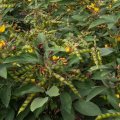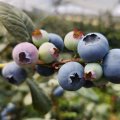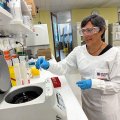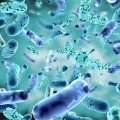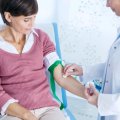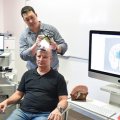
A TEAM led by Queensland Alliance for Agriculture and Food Innovation has developed a comprehensive research program aimed at protecting Australia’s $450 million banana industry.
For the next five years, QAAFI principal research scientist Associate Professor André Drenth of The University of Queensland will spearhead the $6 million Banana Plant Protection Program.
“The banana industry is very familiar with the two main risks to plant production: adverse weather, and pests and diseases,” Dr Drenth said.
“While we can’t control the first one, this program seeks to bring together key research activities required for long-term banana health and streamline plant protection.
“The scale and scope of the program will enable economic delivery of effective outcomes for the industry as a whole and on a national basis.”
Project funding has come from banana grower contributions through levies which are matched through Horticulture Australia Limited, a not-for-profit, industry-owned company that annually invests nearly $90 million into the research, development and marketing of horticulture.
Most of Australia’s annual 274,000 tonne banana crop is grown in tropical far-north Queensland, with the remainder in south-east Qld, northern NSW, WA and the NT.
The QAAFI-led research program developed by Dr Drenth, in collaboration with Queensland Government’s Department of Agriculture, Fisheries and Forestry plant scientists, has been designed to strengthen the capacity of Australia’s dwindling plant protection community.
DAFF science leader Garry Fullelove said the collaborative program was good news for the Australian banana industry.
“This joint initiative brings together a broad range of plant protection knowledge into one project to help ensure the ongoing high health status of one of Australia's major horticultural industries,” Mr Fullelove said.
“It is also another example of the excellent work achieved between Queensland Government and UQ through QAAFI, designed to improve the competitiveness and sustainability of tropical and sub-tropical food, fibre and agribusiness sectors through high-impact science.”
According to Dr Drenth, a proactive approach has been taken to minimise the impact of pests and diseases on the production of bananas.
Instead of fighting pests and pathogens after they have become a major problem, researchers aim to keep banana plants healthy through resistant varieties and improved plant-protection systems.
“Some of the benefits of this program will be the strong link between basic and applied research by bringing together a critical mass of researchers and focussing the research effort on a range of relevant pest and disease problems facing the banana industry,” Dr Drenth said.
“Human capacity, for example, must be built and maintained to provide a committed skills base relevant to our industry with strong long-term international links, and the ability to deal with upcoming pest and disease issues in the field, and have the ability to expertly respond to policy documents such as import risk analysis.”
The program involves research training opportunities for graduate students in many facets of banana production as well as training opportunities for research scientists.
The program is designed to help the banana industry achieve its previously stated desire of delivering a five per cent increase in production efficiency “with minimal to no environmental impact” by 2014.
Dr Drenth is recognised internationally for his work on the biology and management of plant diseases caused by fungi in horticulture and forestry. His research approach underpins the development and implementation of effective and environmentally sustainable ways to control a range of plant diseases.
Media contacts: Dr André Drenth, a.drenth@uq.edu.au, (07) 3255 4391. Ron Hohenhaus, QAAFI Communications, r.hohen@uq.edu.au, +61 7 3346 0553, 0417 425 510.
.jpg)

